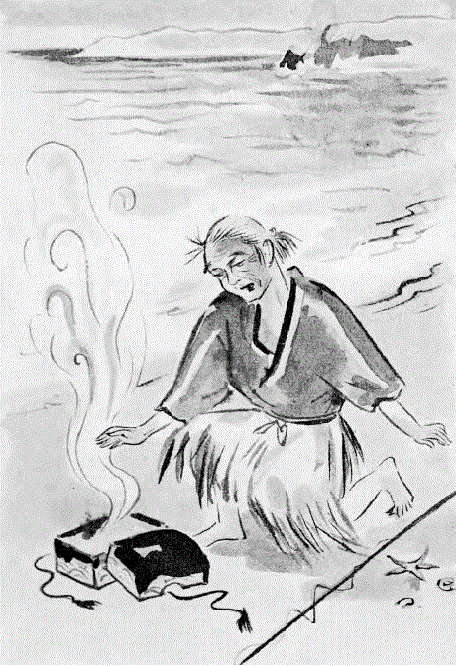Here is some of popular proverbs people in Japan still use in daily conversations. If you know these proverbs, not only you can enjoy conversation but also you will be getting respect immediately. So, let’s learn Japanese Proverbs.
Abata mo ekubo.
Even pockmarks look like dimples.
In pre-Jenner days there must have been in Japan, as in other countries, quite a number of unfortunate people with their faces disfigured by pockmarks. This proverb implies that love is so blind that in the eyes of lovers pockmarks {abata) will look like so many dimples (ekubo). Another proverb of similar import is: Koi wa shian no hoka (Love is beyond reasoning). “Love is blind.”
Aita kuchi ga fusagaranai.
To be unable to close one’s open mouth.
This proverbial expression is often used in reference to the open-mouthed stare with which one looks at a person or thing in wonder, surprise, or stupidity. When a Japanese says “I simply could not shut my open mouth,” he means that he was so astonished that his tongue failed him.
Akete kuyashii tamatebako.
To open a jewel box, only to rue.
This is in allusion to Urashima’s casket which, when opened, proved to be the cause of his undoing, as told in the story of the Japanese Rip Van Winkle. A fish¬erman named Urashima Taro (Taro being his given name), riding on the back of a tortoise, visits the Dragon’s Palace deep down in the sea, where he spends a long, happy time with a charming sea-nymph called Otohime. On leaving the Palace he is presented with a little box (tamatebako) and is told not to look into it. Coming back to his native village, he finds that all has changed beyond recognition. Out of curiosity, he opens the parting gift — against the injunction. Out comes a puff of white smoke and poor Urashima finds himself trans¬formed into a gray-haired old man. The gift box would otherwise have served as the apple of perpetual youth in Scandinavian mythology. This proverb is, therefore, quoted when one is bitterly disappointed contrary to one’s expectations, as over Dead Sea fruit, fair to the eye but nauseous to the taste.

Aki takaku uma koyu.
In autumn (aki) the sky is high and clear, and horses (uma) become fat.
This is part of the Japanized form of a poem by Tu Shen-yen, a Chinese poet, and is often used in reference to the advent of the season of mellowing fruit and tinted foliage. In Japan the four seasons are distinct and clear- cut. When the hot summer is gone and autumn comes, we feel relieved because the cool season sharpens our appetite for reading, as well as for food. Another way
of looking at autumn has been crystallized into several proverbs. The changeableness of the autumnal sky (aki no sora) is compared by women, one of whose privileges is changeableness of mind, to the fickleness of men’s minds (otoko gokoro). Not to be behind, the sterner sex retort saying, “Women’s minds are as changeable as a cat’s eyes.” (Changeable as a gas meter). The phrase, “akikaze ga tatsu” (the autumn wind begins to blow), is a meta¬phorical way of saying that lovers are beginning to cool toward each other. The phrase is based on a play of words; aki, autumn, and aki from the verb, akiru, to get

Akuji mi ni kaeru.
An evil deed (akuji) returns to the doer.
In all probability this is an expression of Buddhist origin. It refers to inevitable retribution. Compare this with the English expression, “What you have done to another, you may expect from another.” Another prov¬erb concerning evil deeds, which is of Chinese origin, says “Akuji senri o hashiru” (An evil deed runs a thou¬sand ri). “Ill news travels apace.” “Ill news has wings.”
Ame futte ji katamaru.
After rain the ground becomes fixed.
This is the Japanese equivalent of “After rain comes fair weather,” “After a storm comes a calm,” “After black clouds, clear weather,” and “Good comes out of evil.” A senryu, a humorous and satiric verse of 17 syllables, says, “Kaminari ga fufu-genka o wajukusase,” which when freely translated means, “After a thun-derstorm comes an amicable settlement of a quarrel between man and wife.”
Anjiru yori umu ga yasushi.
Bearing a child is easier than feared to be.
The throes of childbirth are what expectant mothers in general are afraid of, but experience has often shown that they are not so bad as expected. Born of such experience, this proverb means the same as the English saying, “All things are difficult before they are easy.” “Fear overruns the dangers.”
[More Japanese Proverbs]
“Abata mo ekubo” “Aita kuchi ga fusagaranai” “Akete kuyashii tamate bako”
“Atarazu to iedomo tokarazu” “A to no matsuri” “Atsui samui mo higan made”
“AO WA AI YORI IDETE AI YORI AOSHI” “ASAMESHI MAE NO SHIGOTO” “ASA OKI WA SAN MON NO TOKU”
JTB is the best place to buy Japan Rail Pass, FREE shipping within USA!
Explore Japan’s top destinations with the help of JTB Sunrise Tours
Search JTB’s Special discounted Airfare to Japan and Asia
[Reference]
TOURIST LIBRARY 20 Japanese Proverbs And Proverbial Phrases
Written by Rokuo Okada
Published by JAPAN TRAVEL BUREAU 1955




